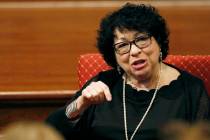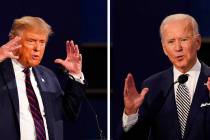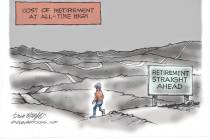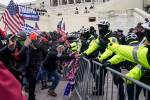The Clintons, incarceration, blame and Black Lives
For the past two years we’ve been inundated with vivid images of black men and women being beaten or killed at the hands of police. We’ve watched in real-time children — mostly poor and brown — being poisoned by tap water. And civil-rights scholars have been discussing and writing books regarding the effects of mass incarceration on black communities.
Some of these wounds are fresh and others feel more like an old sports injury that aches on rainy days. Either way, they’ve caused hyper-sensitive reactions to the candidates vying for our vote. Members of the black community, although not homogeneous in thought, are collectively feeling vulnerable.
Let me preface this by saying I love the work of Michelle Alexander, author of “The New Jim Crow: Mass Incarceration in the Age of Colorblindness.” And I admire the work Black Lives Matter is doing across the country. They both have successfully held a steady spotlight on important issues and actively engaged the public in conversations that were long overdue.
I disagree, however, with the view that places the bulk of the mass incarceration crisis on the Clintons.
Without proper context, our rear-view vision is clouded as we blindly reach back for historical liability that scapegoats two individuals while disregarding those of us who either stood by and did nothing or begged for crime reduction.
There was an epidemic throughout our inner cities as homicide rates soared. We were desperate for answers and relief for mothers who clutched their children’s bullet-riddled bodies. A movement was ignited in the late ’80s to stop the violence and clean up the streets. It was a stop-the-violence crusade inspired by black leaders who demanded the plight of the black community be taken seriously.
The three-strikes policy put forth by then-President Bill Clinton as a part of the Violent Crime Control and Law Enforcement Act felt like a much-needed remedy to a terminally ill community. But like any long-term treatment, adjustments should have been made to alleviate unintentional side-effects.
Broken-window laws and overzealous policing can further disenfranchises crime-riddled neighborhoods that lack the resources to educate their children and employ their parents. Policies were painted with broad strokes and without parameters in place to deter or rehabilitate the formally incarcerated. We couldn’t see how this would disproportionately affect the black community.
Let’s also remember that the original law ushered in a new era of mandatory sentencing. We didn’t anticipate the policy being juxtaposed into a tool for profit and mass incarceration by overzealous prosecutors and lawmakers who molded the law to fit their racist and corrupt agendas.
I continuously say “we,” because we wanted change, we wanted solutions and we wanted a president to lead the change and be tough on crime. And now that the pain and urgency we felt has dulled, we want to make Hillary Clinton culpable for everything that went wrong.
It’s disingenuous to lay the blame at the feet of the former first lady. As American citizens armed with voting power and the responsibility to hold elected officials accountable, we must look inward and admit that our complacent behavior may have exacerbated our current situation.
President Obama has begun the long and onerous process of fixing the problems created by the 1994 crime bill, and the only way we can continue his work is by ensuring we elect the person who has continuously listened to the cries of mothers and fathers struggling to be heard. No candidate is entitled to our vote. We must choose someone who is committed to furthering the policies that will bring us closer to realizing the hope President Obama inspired in the country during his first presidential campaign.
If we focus our energy and efforts on assigning blame rather than forcing long-term systemic change, we do a disservice to the poor, the black and the brown who still languish unnecessarily in the hundreds of for-profit correctional facilities.
Of greater importance, we fail to recognize a valuable teaching moment. One that begins with honest self-reflection.
Kevin E. Hooks is president and CEO of the Las Vegas Urban League.























